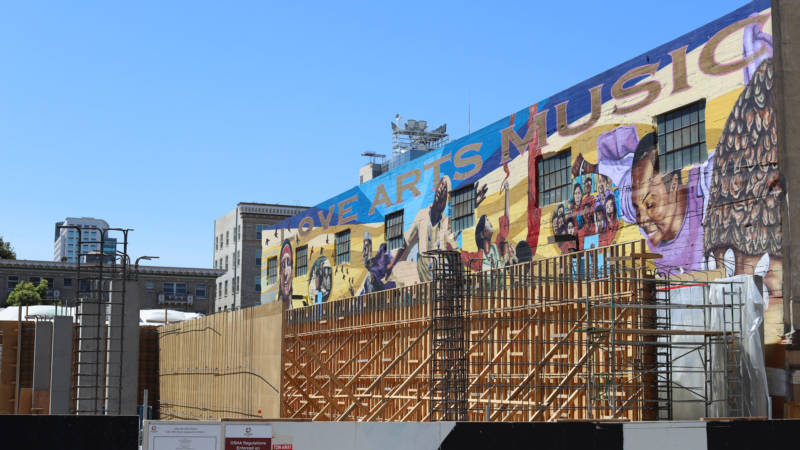Oakland City Council voted Tuesday to approve the appointment of 11 people to the city’s long-dormant Cultural Affairs Commission.
Oakland Appoints Cultural Affairs Commissioners After Nine-Year Hiatus

The commission, inactive since 2011, will advise city officials on policy affecting the arts, and advocate for the Cultural Funding Program (CFP), which awards $1 million to local artists and nonprofits annually. Its revival marks another step in the city’s fitful efforts to buoy the arts.
The appointees are working artists, nonprofit professionals and policy experts including Theo “Aytchan” Williams, director of Carnaval arts group SambaFunk; Jennifer Easton, public art director at Bay Area Rapid Transit; Diane Sanchez, a philanthropy consultant; and Kevin “Kev” Choice, an educator and musician who’s worked with Goapele and Lauryn Hill. (Full list below.)
Oakland Mayor Libby Schaaf praised the new commissioners and their connections to the city. “The importance of arts and culture in creating a vibrant and just city is shown by the breadth of experience of the commission members who are dancers, musicians, curators, cultural strategists, educators, non-profit administrators, lawyers, publishers, writers, storytellers, community organizers and civil engineers,” she said in a statement.
Williams of SambaFunk, one of the Afro-diasporic dance and drumming organizations based in the city-owned Malonga Casquelourd Center for the Arts, said he’s pleased to represent performing arts often overlooked next to ballet and the symphony. Like most local arts figures with an eye on City Hall, Williams also sees a gap to close between officials’ praise of Oakland’s cultural life and investment in its perseverance. “So the main thing is more funding,” he said.
“This conversation is old,” Williams added. “We have a document from ’98 about the woes of the Malonga, what was then the Alice Arts Center, and they’re almost verbatim the same as now.”
The commission is an unpaid one- to three-year position, and appointees are ineligible for CFP grants during their tenure. Commissioner Charmin Roundtree-Baaqee also serves on the Public Art Advisory Committee. A total of 93 people applied for the post, according to a staff report, and council members approved Schaaf’s 11 appointments Tuesday night.
Roberto Bedoya, Oakland’s cultural affairs manager since 2016, calls the commissioners “ambassadors and advocates,” describing their role as drumming up support for and illustrating the value of the Cultural Funding Program. In 2018, Oakland adopted a Cultural Plan for alleviating cost-of-living pressures on local artists and sustaining community identity, but city officials have not provided funding significant enough to enact most of its recommendations.
CFP staff is struggling under increased demand for grants. The number of applications rose 25 percent between 2018 and 2019 to a total of 171, CFP records show. Partly due to the mounting workload, with only a few staffers administering a multi-step ranking and approval process, this year sees the art-in-schools grant category temporarily suspended. According to the Cultural Plan, Oakland’s inflation-adjusted grant-making budget is half of what it was in 2001.
And it’s shrinking: A onetime $230,000 nudge to the CFP budget from 2017 lapses this year, resulting in an expected 17 percent reduction. A $100,000 murals set-aside from 2017 also recently disappeared before it could be spent, Bedoya said at a recent committee hearing, due to anticipated revenue shortfalls after council members reduced cannabis taxes. “If I can have commissioners call up and say, ‘Gimme back that money,’ it would help a lot,” Bedoya said.
The Cultural Funding Program regularly supports organizations such as Creative Growth, The Crucible, Oakland Ballet, Ubuntu Theater Project and Pro Arts as well as individual artists such as Karen Smith, the subject of a recent profile for The Hustle, KQED’s series about artists and money. One storyline in Tommy Orange’s acclaimed 2018 novel There, There draws on the author’s CFP-supported oral history project.
The Cultural Affairs Commission appointees are:
Roy Chan, Community planning manager at the Chinatown Community Development Center
Jennifer Easton, Public art director at San Francisco Bay Area Rapid Transit
Michael Orange, Founding director of Matatu
Vanessa Whang, Lead consultant on the Cultural Plan
Kevin “Kev” Choice, Music instructor at Oakland School for the Arts
JK Fowler, Founder and executive director of Nomadic Press
Michelle Lee, Founder of Whole Story Group
Diane Sanchez, Philanthropy consultant
Richard Raya, Legal educator at Centro Legal de la Raza
Charmin Roundtree-Baaqee, Founder of Art is Luv
Theo “Aytchan” Williams, Director of SambaFunk

